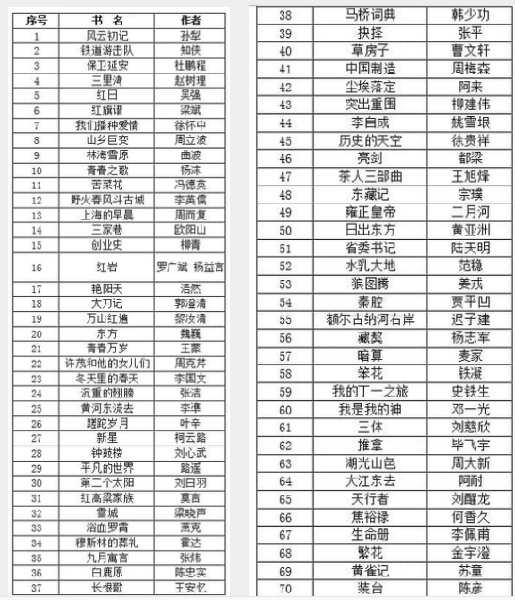
Fittingly, to celebrate the upcoming 70th anniversary of the birth of the PRC, a list of 70 post-1949 novels—“must-stock” classics for libraries nationwide, apparently — has been drawn up by the People’s Literature Publishing House and Xuexi Publishing House. See here for the Xinhua press release and full list.
Given that about one out of ten PRC citizens is identified on his or her ID card as a member of an ethnic minority, it might be interesting to scan the list for novels that classify as "ethnic fiction," i.e., a loose category (民族题材文学) that includes stories — regardless of the author’s ethnicity — in which non-Han culture, motifs or characters play an important role.
I count six (and note only the English translator): 穆斯林的葬礼 (Funeral of a Muslim, by Huo Da); 尘埃落定 (Red Poppies, by Alai. Translators: Howard Goldblatt and Sylvia Li-Chun Lin); Mastiffs of the Plateau (藏獒 by Yang Zhijun); 水乳大地 (by Fan Wen); 狼图腾 (Wolf Totem, by Jiang Rong. Translator: Howard Goldblatt); 额尔古纳河右岸 (Last Quarter of the Moon, by Chi Zijian. Translator: Bruce Humes).
A few interesting points:
Authors: Just 2 of the 6 are non-Han authors writing about their own people/culture.
Translators: Goldblatt translated two of the best known novels. As far as I know, the only woman involved in any of the above is Sylvia Li-Chun Lin, Goldblatt’s longtime co-translator. An English translation of Funeral of a Muslim is reportedly underway, but I do not know by whom.
Editions: At least two of these novels have been translated into 2 or more languages. Doubtless Penguin’s Wolf Totem has been the most widely rendered in a foreign tongue, but Last Quarter of the Moon is now out in 9 languages, most recently Arabic. Fan Wen’s Une terre de lait et de miel has been published in French (translated by Stéphane Lévêque), and another novel in this trilogy, Land of Mercy, has been translated by Shelly Bryant.
On the Screen: Jean-Jacques Anneau directed Wolf Totem, and an animé version of Yang Zhijun’s novel, The Tibetan Dog, has been co-produced by Japan’s Madhouse and China Film Group Corp.
For an overview of the translation and reception of ethnic-themed Chinese novels, see here.


Comments
Thanks, Bruce. You’ve highlighted six and focused on non-Han writers. Of the other 64, quite a number have been translated (at least into English) - and if not these titles, then other titles by the same 70 authors have been translated into English. Eg ZHANG Jie’s “Leaden Wings”, Han Shaogong’s “Diary of Maqiao” (both titles on the list) - the Paper Republic database has details.
Helen Wang, September 27, 2019, 8:12a.m.
Of the other 64 titles
Helen Wang, September 27, 2019, 8:14a.m.
Helen: You're quite right to point that out!
I've added a paragraph -- seems I deleted it earlier -- to explain that this post is intended to discuss ethnic fiction only. Sorry!
Bruce Humes, September 27, 2019, 8:24a.m.
Several years ago I asked someone from Paper Republic (I think it was, foggy memory, might have a foreigner been working for a govt bureau) about ethnic literature. She responded somewhat enthusiastically, but intimated that the Chinese didn't seem so keen on the whole thing. Aside from good old-style Han chauvinism, it seems to me that government policy has a lot to do with it. China just doesn't seem to feel very comfortable with ethnic minorities having a literature in their own language. It's much better if they write in Chinese because that is, of course, the 'national language'.
Greg, September 27, 2019, 12:58p.m.
Just to note, Funeral of a Muslim is currently being translated by Rachel Henson, though it doesn't have an English-language publisher yet.
Eric Abrahamsen, October 3, 2019, 8p.m.